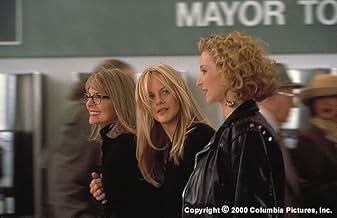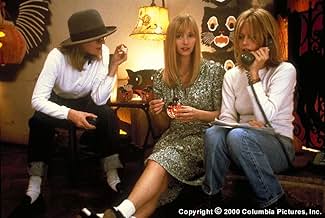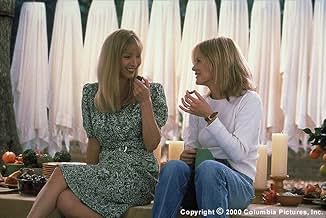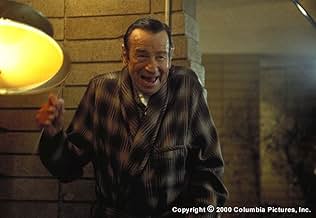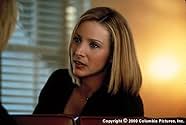VALUTAZIONE IMDb
4,9/10
13.510
LA TUA VALUTAZIONE
Un trio di sorelle si lega alla loro ambivalenza verso la morte imminente del loro burbero padre, al quale nessuna di loro era particolarmente legata.Un trio di sorelle si lega alla loro ambivalenza verso la morte imminente del loro burbero padre, al quale nessuna di loro era particolarmente legata.Un trio di sorelle si lega alla loro ambivalenza verso la morte imminente del loro burbero padre, al quale nessuna di loro era particolarmente legata.
- Premi
- 2 vittorie e 1 candidatura in totale
Shaun Duke
- Omar Kunundar
- (as Duke Moosekian)
Elizabeth Hudson
- Georgia's Assistant
- (as Libby Hudson)
Recensioni in evidenza
This movie is definitely not what I had expected. With a cast like this I expected a great comedy. But the movie was boring and confusing. There are too many flashbacks. Maybe it is just me, but I found it difficult to understand what was going on. Of course, that could also have something to do with the fact that it was very difficult for me to stay focused. What a shame this was going to be Walter Matthau's last movie. I you found this movie good or even funny, you must be more intellectual than me.
My main motivation for renting this movie was to see Walter Matthau's final performance. Matthau was one of our most talented, all-around actors. It was sad to see him go, but his performance in this movie was a fine conclusion to his thriving career. I don't think he could've picked a better final role to play. And being that Matthau played a dying father, it was even more heartbreaking to watch. I didn't break into tears any time during the movie, but I came close to it quite a few times.
First off, "Hanging Up" was pretty much marketed as a comedy. A fluffy romantic comedy, or chick-flick if you want to go with the stereotype. There are undeniably some very funny moments, but it's all done as comic relief. Overall, this is a sad, touching story that should hit home to many people who've had--or have--severed communications with their siblings or parents. I personally don't experience that in my family, but I know many who do. The father-daughter relationship, especially between Meg Ryan and Matthau, is brutally realistic. It's very touching to see how the two of them stick with each other through thick and thin, even through Dad's messy alcoholic rages. The other two sisters, Lisa Kudrow and Diane Keaton, have grown distant from their sick, elderly father with Alstheimer's Disease. While Ryan uses every ounce of her free time to visit her Dad in the hospital, the other sisters use their work as an excuse for never finding time.
I've heard people say that the scenarios in this film are unrealistic. Well, as far as I understand, the movie is based on the real life relationships of the Ephron sisters (who wrote the screenplay). Of course, there's some witty dialogue and situations that were obviously thrown in for entertainment purposes, but it's all based on real life. Truth can be stranger than fiction. Besides, I wasn't once doubting the plausibility of the film. Maybe it's because I was so indulged in the characters and the spirited performances, but whatever it was--it worked.
I have to say, I never thought Meg Ryan looked really attractive, before I saw her in "You've Got Mail." I liked her "When Harry Met Sally..." and some of her past movies, but she just had a conservative, housewifey appearance that never really did anything for me. Now she looks soooooooo cute with her straight blonde hair. Every minute she was on screen I just wanted to run up to the screen and kiss her! And may I say, she has a smile to die for.
Walter Matthau is both entertaining and touching in an understated performance that he should be remembered for, not just because it was his last performance (Hell, I loved John Candy, but I'm not going to say his performance in "Wagon's East" was the greatest), but because it was a brilliant one. Not only does he make the funniest, sometimes vulgar and off-color, wisecracks but he's so likable. Yet he has an alcohol problem. Showing us that even the most likable people have their faults. You do feel the sisters' pain when (in a flashback) Matthau barges into his grandson's birthday party, completely drunk, yelling obscenities, humiliating everyone and finally destroying the party altogether and causing the kids to cry, but you also feel his pain when his daughter's husband (Adam Arkin) chases him out of the house and wants to make sure that he never sets foot in the house again.
"Hanging Up" has everything you can possibly want in a film: humor, romance, sentiment, drama, moments of truth. Yet it's not delivered in a schmaltzy, "Lifetime" Movie of the Week format. And you leave with a good feeling in your heart. I definitely recommend this movie, especially since it reached a very scant audience in theaters. Just make sure you have the phone numbers of your sisters or fathers handy, because you're definitely gonna want to give them a call afterwards!
My score: 7 (out of 10)
First off, "Hanging Up" was pretty much marketed as a comedy. A fluffy romantic comedy, or chick-flick if you want to go with the stereotype. There are undeniably some very funny moments, but it's all done as comic relief. Overall, this is a sad, touching story that should hit home to many people who've had--or have--severed communications with their siblings or parents. I personally don't experience that in my family, but I know many who do. The father-daughter relationship, especially between Meg Ryan and Matthau, is brutally realistic. It's very touching to see how the two of them stick with each other through thick and thin, even through Dad's messy alcoholic rages. The other two sisters, Lisa Kudrow and Diane Keaton, have grown distant from their sick, elderly father with Alstheimer's Disease. While Ryan uses every ounce of her free time to visit her Dad in the hospital, the other sisters use their work as an excuse for never finding time.
I've heard people say that the scenarios in this film are unrealistic. Well, as far as I understand, the movie is based on the real life relationships of the Ephron sisters (who wrote the screenplay). Of course, there's some witty dialogue and situations that were obviously thrown in for entertainment purposes, but it's all based on real life. Truth can be stranger than fiction. Besides, I wasn't once doubting the plausibility of the film. Maybe it's because I was so indulged in the characters and the spirited performances, but whatever it was--it worked.
I have to say, I never thought Meg Ryan looked really attractive, before I saw her in "You've Got Mail." I liked her "When Harry Met Sally..." and some of her past movies, but she just had a conservative, housewifey appearance that never really did anything for me. Now she looks soooooooo cute with her straight blonde hair. Every minute she was on screen I just wanted to run up to the screen and kiss her! And may I say, she has a smile to die for.
Walter Matthau is both entertaining and touching in an understated performance that he should be remembered for, not just because it was his last performance (Hell, I loved John Candy, but I'm not going to say his performance in "Wagon's East" was the greatest), but because it was a brilliant one. Not only does he make the funniest, sometimes vulgar and off-color, wisecracks but he's so likable. Yet he has an alcohol problem. Showing us that even the most likable people have their faults. You do feel the sisters' pain when (in a flashback) Matthau barges into his grandson's birthday party, completely drunk, yelling obscenities, humiliating everyone and finally destroying the party altogether and causing the kids to cry, but you also feel his pain when his daughter's husband (Adam Arkin) chases him out of the house and wants to make sure that he never sets foot in the house again.
"Hanging Up" has everything you can possibly want in a film: humor, romance, sentiment, drama, moments of truth. Yet it's not delivered in a schmaltzy, "Lifetime" Movie of the Week format. And you leave with a good feeling in your heart. I definitely recommend this movie, especially since it reached a very scant audience in theaters. Just make sure you have the phone numbers of your sisters or fathers handy, because you're definitely gonna want to give them a call afterwards!
My score: 7 (out of 10)
The best scene in this Diane Keaton-directed film has drunken dad Walter Matthau showing up at a kid's birthday party bellowing and vulgar, but it doesn't belong in a comedy. It's more like something out of "Shoot The Moon", which Keaton starred in, and would fit much better in a film with a darker tone. "Hanging Up" wobbles around in search of appropriate emotions, but Keaton just can't get a consistent rhythm going. Her performance as the eldest of three unhappy sisters is also wan (she's winging it), however Meg Ryan as the middle sister has some fabulous moments: she hugs a coffee machine, she tries to convince her husband that driving a wrecked truck is going to work for her, she tells off her father but cries because she loves him. This is a performance well worth watching, but the picture definitely needed a director with a tighter grip on the reins. ** from ****
I saw the DVD because I knew it was Walter Matthau's last film, otherwise I would have skipped it. This was incredibly boring and stupid. Walter was the only one showing any talent. I realize that he was still living when the film was released but newer DVD's could show "in memory of Walter Matthau". By the way, the dvd has both wide screen and full screen. The full screen is better here because the widescreen version is not anamorphic, only masked.
I rented this movie (`Hanging Up') and I found it devastatingly effective.
At the center of the movie is Meg Ryan, whose movies I've not seen a lot. Her character, Eve, is really the fulcrum on which the whole movie balances. Much as her character's car is boxed in by a parking-garage accident early in the movie, I got the feeling that the movie was a meditation on whether her life is of her own choosing and making, or whether it is something she has largely been trapped into.
Part of the art of the movie is, I feel, that the character doesn't really know. This isn't made explicit in dialogue - rather, you can see it in her face as she repeatedly goes through situations in her life. And in her reactions to those situations, you can see the many little waves of emotion sweeping over her, all vying for the upper hand. It's as if she's perpetually trying to find her place and regain her balance.
And this may be what some people who saw the movie and didn't like it don't see: at times, you wonder if she's really going to crack. An example is the brilliantly conceived set of characters represented by Eve's mother (in a brief appearance by Cloris Leachman) and Eve's husband (who has slightly more screen time). Each very clearly rejects Eve's father. But, in doing so, each of them places, perhaps unwittingly, a huge demand on her. For Eve, to live in the world that is dictated by others' expectations and reactions, whether reasonable or unreasonable, is to deny herself. And yet, the paradox is that, while her continued interactions with her father and sisters represent a possibly destructive degree of self-denial, in all the caring she dispenses to others, she is her best self. Her use of the phone is the clear metaphor for that she can't stand to stay on it, and yet she can't stand to stay off of it.
Diane Keaton's direction is very impressive in the movie, in my opinion. The staging and editing are first rate, and really frame the story beautifully. Her acting performance in the film is a little awkward, but her ability as a director to really get the actors to play with a subtlety and spontaneity in their reactions to each other (particularly in scenes between Meg Ryan and Lisa Kudrow) is very skilled.
I think that if a viewer sees the movie as just a light comedy or a succession of gags, they have really missed the point of what Diane Keaton is trying to do. I find that hard to fathom, because Meg Ryan's central performance clearly is meant to showcase the character's essential emotional confusion, and I feel like the direction emphasizes this repeatedly. Maybe some viewers are distracted by Meg Ryan's beauty, which may have had the effect of setting up some distance between themselves and the character. It could be argued that Keaton allowed Ryan to be so well dressed, often in extremely flattering outfits of pastel colors, that it's hard to take seriously that the character could be an emotional mess. Eve may have inadvertently been robbed of some of the character's gravitas as a result.
I see a lot of darkness in Walter Matthau's character as well, but the affection between him and the Meg Ryan character is also very clear. Adam Arkin contributes a fine supporting performance in the movie as Eve's husband. His character could have easily been so blandly cast that it would have sunk right into the background, but he is a confrontational, yet gentle, force in Eve's life, and helps call the question as to whether Eve's life is in the state it's in by her own choice or not.
So, to sum up, I think that to dismiss `Hanging Up' as a heartwarming bauble is to miss a lot. The central character is a woman that is pulled and tugged in so many directions, all in the midst of a life that looks deceptively normal given her stresses, but is really one that remains hers to define. By the end of the movie, you can see in Ryan's expressions (and judge for yourself) the degree to which she has, or has not, come to a level of acceptance about her lot.
At the center of the movie is Meg Ryan, whose movies I've not seen a lot. Her character, Eve, is really the fulcrum on which the whole movie balances. Much as her character's car is boxed in by a parking-garage accident early in the movie, I got the feeling that the movie was a meditation on whether her life is of her own choosing and making, or whether it is something she has largely been trapped into.
Part of the art of the movie is, I feel, that the character doesn't really know. This isn't made explicit in dialogue - rather, you can see it in her face as she repeatedly goes through situations in her life. And in her reactions to those situations, you can see the many little waves of emotion sweeping over her, all vying for the upper hand. It's as if she's perpetually trying to find her place and regain her balance.
And this may be what some people who saw the movie and didn't like it don't see: at times, you wonder if she's really going to crack. An example is the brilliantly conceived set of characters represented by Eve's mother (in a brief appearance by Cloris Leachman) and Eve's husband (who has slightly more screen time). Each very clearly rejects Eve's father. But, in doing so, each of them places, perhaps unwittingly, a huge demand on her. For Eve, to live in the world that is dictated by others' expectations and reactions, whether reasonable or unreasonable, is to deny herself. And yet, the paradox is that, while her continued interactions with her father and sisters represent a possibly destructive degree of self-denial, in all the caring she dispenses to others, she is her best self. Her use of the phone is the clear metaphor for that she can't stand to stay on it, and yet she can't stand to stay off of it.
Diane Keaton's direction is very impressive in the movie, in my opinion. The staging and editing are first rate, and really frame the story beautifully. Her acting performance in the film is a little awkward, but her ability as a director to really get the actors to play with a subtlety and spontaneity in their reactions to each other (particularly in scenes between Meg Ryan and Lisa Kudrow) is very skilled.
I think that if a viewer sees the movie as just a light comedy or a succession of gags, they have really missed the point of what Diane Keaton is trying to do. I find that hard to fathom, because Meg Ryan's central performance clearly is meant to showcase the character's essential emotional confusion, and I feel like the direction emphasizes this repeatedly. Maybe some viewers are distracted by Meg Ryan's beauty, which may have had the effect of setting up some distance between themselves and the character. It could be argued that Keaton allowed Ryan to be so well dressed, often in extremely flattering outfits of pastel colors, that it's hard to take seriously that the character could be an emotional mess. Eve may have inadvertently been robbed of some of the character's gravitas as a result.
I see a lot of darkness in Walter Matthau's character as well, but the affection between him and the Meg Ryan character is also very clear. Adam Arkin contributes a fine supporting performance in the movie as Eve's husband. His character could have easily been so blandly cast that it would have sunk right into the background, but he is a confrontational, yet gentle, force in Eve's life, and helps call the question as to whether Eve's life is in the state it's in by her own choice or not.
So, to sum up, I think that to dismiss `Hanging Up' as a heartwarming bauble is to miss a lot. The central character is a woman that is pulled and tugged in so many directions, all in the midst of a life that looks deceptively normal given her stresses, but is really one that remains hers to define. By the end of the movie, you can see in Ryan's expressions (and judge for yourself) the degree to which she has, or has not, come to a level of acceptance about her lot.
Lo sapevi?
- QuizWalter Matthau's final role. In very poor health throughout filming, he suffered from several cardiovascular problems, and had more than two heart attacks since his first in 1965. He died over seven months later, four months after the film's release.
- BlooperThere is no second floor to the Richard M. Nixon Library in Yorba Linda, California.
- Citazioni
Lou Mozell: You know, that I actually met a girl by the name of Moo Goo Gai Pan? That was her last name. Her first name was Freida. Freida Moo Goo Gai Pan. She was half-Jewish, half-Chinese. A lot of people called her the Ori-Yenta.
- Versioni alternativeA flashback scene set in a New York City Chinese restaurant in the early 1990s where the sisters have a dinner with their father that ends in disaster was filmed, but ultimately cut from the final film.
- Colonne sonoreOnce Upon A Time
Music by Charles Strouse
Lyrics by Lee Adams
Performed by Jay McShann
Courtesy of Sackville Records
I più visti
Accedi per valutare e creare un elenco di titoli salvati per ottenere consigli personalizzati
Dettagli
- Data di uscita
- Paesi di origine
- Lingua
- Celebre anche come
- Hanging Up
- Luoghi delle riprese
- Aziende produttrici
- Vedi altri crediti dell’azienda su IMDbPro
Botteghino
- Budget
- 60.000.000 USD (previsto)
- Lordo Stati Uniti e Canada
- 36.050.230 USD
- Fine settimana di apertura Stati Uniti e Canada
- 13.567.978 USD
- 20 feb 2000
- Lordo in tutto il mondo
- 51.880.044 USD
- Tempo di esecuzione
- 1h 34min(94 min)
- Colore
- Mix di suoni
- Proporzioni
- 1.85 : 1
Contribuisci a questa pagina
Suggerisci una modifica o aggiungi i contenuti mancanti


